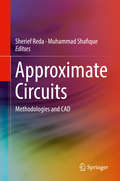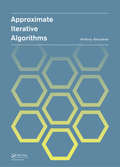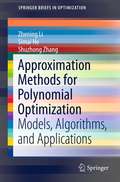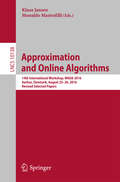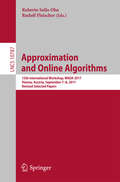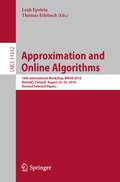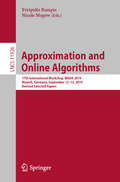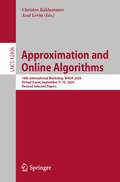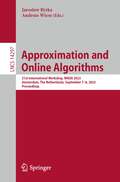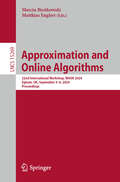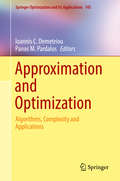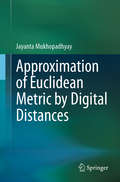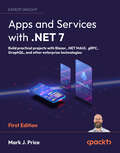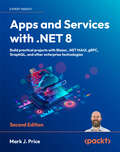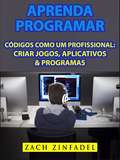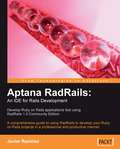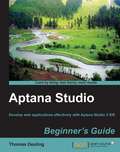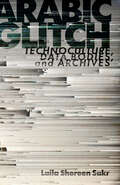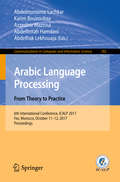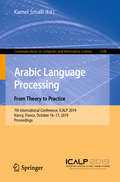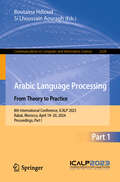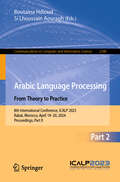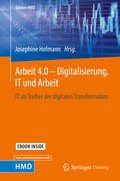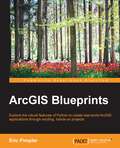- Table View
- List View
Approximate Circuits: Methodologies and CAD
by Muhammad Shafique Sherief RedaThis book provides readers with a comprehensive, state-of-the-art overview of approximate computing, enabling the design trade-off of accuracy for achieving better power/performance efficiencies, through the simplification of underlying computing resources. The authors describe in detail various efforts to generate approximate hardware systems, while still providing an overview of support techniques at other computing layers. The book is organized by techniques for various hardware components, from basic building blocks to general circuits and systems.
Approximate Iterative Algorithms
by Anthony Louis AlmudevarIterative algorithms often rely on approximate evaluation techniques, which may include statistical estimation, computer simulation or functional approximation. This volume presents methods for the study of approximate iterative algorithms, providing tools for the derivation of error bounds and convergence rates, and for the optimal design of such
Approximation Methods for Polynomial Optimization: Models, Algorithms, and Applications (SpringerBriefs in Optimization)
by Zhening Li Simai He Shuzhong ZhangPolynomial optimization have been a hot research topic for the past few years and its applications range from Operations Research, biomedical engineering, investment science, to quantum mechanics, linear algebra, and signal processing, among many others. In this brief the authors discuss some important subclasses of polynomial optimization models arising from various applications, with a focus on approximations algorithms with guaranteed worst case performance analysis. The brief presents a clear view of the basic ideas underlying the design of such algorithms and the benefits are highlighted by illustrative examples showing the possible applications. This timely treatise will appeal to researchers and graduate students in the fields of optimization, computational mathematics, Operations Research, industrial engineering, and computer science.
Approximation and Online Algorithms: 14th International Workshop, WAOA 2016, Aarhus, Denmark, August 25–26, 2016, Revised Selected Papers (Lecture Notes in Computer Science #10138)
by Klaus Jansen Monaldo MastrolilliThis book constitutes the thoroughly refereed post workshop proceedings of the 8th International Workshop on Approximation and Online Algorithms, WAOA 2010, held in Liverpool, UK, in September 2010 as part of the ALGO 2010 conference event. The 23 revised full papers presented were carefully reviewed and selected from 58 submissions. The workshop covered areas such as algorithmic game theory, approximation classes, coloring and partitioning, competitive analysis, computational finance, cuts and connectivity, geometric problems, inapproximability results, echanism design, network design, packing and covering, paradigms for design and analysis of approximation and online algorithms, parameterized complexity, randomization techniques, real-world applications, and scheduling problems.
Approximation and Online Algorithms: 15th International Workshop, WAOA 2017, Vienna, Austria, September 7–8, 2017, Revised Selected Papers (Lecture Notes in Computer Science #10787)
by Rudolf Fleischer Roberto Solis-ObaThis book constitutes the thoroughly refereed workshop post-proceedings of the 15th International Workshop on Approximation and Online Algorithms, WAOA 2017, held in Vienna, Austria, in September 2017 as part of ALGO 2017.The 23 revised full papers presented in this book were carefully reviewed and selected from 50 submissions. Topics of interest for WAOA 2017 were: graph algorithms; inapproximability results; network design; packing and covering; paradigms for the design and analysis of approximation and online algorithms; parameterized complexity; scheduling problems; algorithmic game theory; coloring and partitioning; competitive analysis; computational advertising; computational finance; cuts and connectivity; geometric problems; mechanism design; resource augmentation; and real-world applications.
Approximation and Online Algorithms: 16th International Workshop, WAOA 2018, Helsinki, Finland, August 23-24, 2018, Revised Selected Papers (Lecture Notes in Computer Science #11312)
by Leah Epstein Thomas ErlebachThis book constitutes the thoroughly refereed workshop post-proceedings of the 16th International Workshop on Approximation and Online Algorithms, WAOA 2018, held in Helsinki, Finland, in August 2018 as part of ALGO 2018. The 19 revised full papers presented together with one invited paper in this book were carefully reviewed and selected from 44 submissions. Topics of interest for WAOA 2016 were: graph algorithms; inapproximability results; network design; packing and covering; paradigms for the design and analysis of approximation and online algorithms; parameterized complexity; scheduling problems; algorithmic game theory; algorithmic trading; coloring and partitioning; competitive analysis; computational advertising; computational finance; cuts and connectivity; geometric problems; mechanism design; resource augmentation; and real-world applications.
Approximation and Online Algorithms: 17th International Workshop, WAOA 2019, Munich, Germany, September 12–13, 2019, Revised Selected Papers (Lecture Notes in Computer Science #11926)
by Evripidis Bampis Nicole MegowThis book constitutes the thoroughly refereed workshop post-proceedings of the 17th International Workshop on Approximation and Online Algorithms, WAOA 2019, held in Munich, Germany, in September 2019 as part of ALGO 2019.The 16 revised full papers presented together with one invited paper in this book were carefully reviewed and selected from 38 submissions. Topics of interest for WAOA 2018 were: graph algorithms; inapproximability results; network design; packing and covering; paradigms for the design and analysis of approximation and online algorithms; parameterized complexity; scheduling problems; algorithmic game theory; algorithmic trading; coloring and partitioning; competitive analysis; computational advertising; computational finance; cuts and connectivity; geometric problems; mechanism design; resource augmentation; and real-world applications.
Approximation and Online Algorithms: 18th International Workshop, WAOA 2020, Virtual Event, September 9–10, 2020, Revised Selected Papers (Lecture Notes in Computer Science #12806)
by Christos Kaklamanis Asaf LevinThis book constitutes the thoroughly refereed workshop post-proceedings of the 18th International Workshop on Approximation and Online Algorithms, WAOA 2019, held virtually in September 2020 as part of ALGO 2020.The 15 revised full papers presented this book were carefully reviewed and selected from 40 submissions. Topics of interest for WAOA 2018 were graph algorithms, inapproximability results, network design, packing and covering, paradigms for the design and analysis of approximation and online algorithms, parameterized complexity, scheduling problems, algorithmic game theory, algorithmic trading, coloring and partitioning, competitive analysis, computational advertising, computational -finance, cuts and connectivity, geometric problems, mechanism design, resource augmentation, real-world applications.Chapter "Explorable Uncertainty in Scheduling with Non-Uniform Testing Times" is available open access under a Creative Commons Attribution 4.0 International License via link.springer.com.
Approximation and Online Algorithms: 21st International Workshop, WAOA 2023, Amsterdam, The Netherlands, September 7–8, 2023, Proceedings (Lecture Notes in Computer Science #14297)
by Andreas Wiese Jarosław ByrkaThis book constitutes the refereed proceedings of the 21st International Workshop on Approximation and Online Algorithms, WAOA 2023, held in Amsterdam, The Netherlands, during September 7–8, 2023The 16 full papers included in this book are carefully reviewed and selected from 43 submissions. The topics of WAOA 2023 were algorithmic game theory, algorithmic trading, coloring and partitioning, competitive analysis, computational advertising, computational finance, cuts and connectivity, FPT-approximation algorithms, geometric problems, graph algorithms, inapproximability results, mechanism design, network design, packing and covering, paradigms for the design and analysis of approximation and online algorithms, resource augmentation, and scheduling problems
Approximation and Online Algorithms: 22nd International Workshop, WAOA 2024, Egham, UK, September 5–6, 2024, Proceedings (Lecture Notes in Computer Science #15269)
by Marcin Bieńkowski Matthias EnglertThis book constitutes the refereed proceedings of the 22nd International Workshop on Approximation and Online Algorithms, WAOA 2024, held in Egham, UK, during September 5–6, 2024. The 15 full papers included in this book were carefully reviewed and selected from 47 submissions. They were organized in topical sections as follows: algorithmic game theory, algorithmic trading, coloring and partitioning, competitive analysis, computational advertising, computational finance, cuts and connectivity, FPT approximation algorithms, geometric problems, graph algorithms, inapproximability results, mechanism design, network design, packing and covering, paradigms for designing and analyzing approximation and online algorithms, resource augmentation, and scheduling problems.
Approximation and Online Algorithms: 4th International Workshop, Waoa 2006, Zurich, Switzerland, September 14-15, 2006, Revised Papers (Lecture Notes In Computer Science Ser. #4368)
by Christos Kaklamanis Asaf LevinThis book constitutes the thoroughly refereed workshop post-proceedings of the 18th International Workshop on Approximation and Online Algorithms, WAOA 2019, held virtually in September 2020 as part of ALGO 2020. <P><P> The 15 revised full papers presented this book were carefully reviewed and selected from 40 submissions. Topics of interest for WAOA 2018 were graph algorithms, inapproximability results, network design, packing and covering, paradigms for the design and analysis of approximation and online algorithms, parameterized complexity, scheduling problems, algorithmic game theory, algorithmic trading, coloring and partitioning, competitive analysis, computational advertising, computational -finance, cuts and connectivity, geometric problems, mechanism design, resource augmentation, real-world applications. Chapter "Explorable Uncertainty in Scheduling with Non-Uniform Testing Times" is available open access under a Creative Commons Attribution 4.0 International License via link.springer.com.
Approximation and Optimization: Algorithms, Complexity and Applications (Springer Optimization and Its Applications #145)
by Panos M. Pardalos Ioannis C. DemetriouThis book focuses on the development of approximation-related algorithms and their relevant applications. Individual contributions are written by leading experts and reflect emerging directions and connections in data approximation and optimization. Chapters discuss state of the art topics with highly relevant applications throughout science, engineering, technology and social sciences. Academics, researchers, data science practitioners, business analysts, social sciences investigators and graduate students will find the number of illustrations, applications, and examples provided useful. This volume is based on the conference Approximation and Optimization: Algorithms, Complexity, and Applications, which was held in the National and Kapodistrian University of Athens, Greece, June 29–30, 2017. The mix of survey and research content includes topics in approximations to discrete noisy data; binary sequences; design of networks and energy systems; fuzzy control; large scale optimization; noisy data; data-dependent approximation; networked control systems; machine learning ; optimal design; no free lunch theorem; non-linearly constrained optimization; spectroscopy.
Approximation of Euclidean Metric by Digital Distances
by Jayanta MukhopadhyayThis book discusses different types of distance functions defined in an n-D integral space for their usefulness in approximating the Euclidean metric. It discusses the properties of these distance functions and presents various kinds of error analysis in approximating Euclidean metrics. It also presents a historical perspective on efforts and motivation for approximating Euclidean metrics by digital distances from the mid-sixties of the previous century. The book also contains an in-depth presentation of recent progress, and new research problems in this area.
Apps and Services with .NET 7: Build practical projects with Blazor, .NET MAUI, gRPC, GraphQL, and other enterprise technologies
by Mark J. PriceBestselling author Mark Price is back to guide you through the coolest and most common technologies a .NET developer should know: Blazor, .NET MAUI, gRPC, GraphQL, SQL Server, Cosmos DB, OData, SignalR, Azure Functions, and more!Purchase of the print or Kindle book includes a free eBook in PDF format.Key FeaturesBuild services using a variety of technologies including Web API, OData, gRPC, GraphQL, SignalR, and Azure FunctionsLearn how to use specialized libraries to improve all aspects of your applications, including performance and localizationLeverage .NET MAUI to develop cross-platform desktop and mobile apps with easeBook DescriptionApps and Services with .NET 7 is for .NET 6 and .NET 7 developers who want to kick their C# and .NET understanding up a gear by learning the practical skills and knowledge they need to build real-world applications and services. It covers specialized libraries that will help you monitor and improve performance, secure your data and applications, and internationalize your code and apps.With chapters that put a variety of technologies into practice, including Web API, OData, gRPC, GraphQL, SignalR, and Azure Functions, this book will give you a broader scope of knowledge than other books that often focus on only a handful of .NET technologies. It covers the latest developments, libraries, and technologies that will help keep you up to date.You'll also leverage .NET MAUI to develop mobile apps for iOS and Android as well as desktop apps for Windows and macOS.What you will learnLearn how to build more efficient, secure, and scalable apps and servicesLeverage specialized .NET libraries to improve your applicationsImplement popular third-party libraries like Serilog and FluentValidationBuild cross-platform apps with .NET MAUI and integrate with native mobile featuresGet familiar with a variety of technologies for implementing services like gRPC and GraphQLExplore Blazor WebAssembly and use open-source Blazor component librariesStore and manage data locally and in the cloud with SQL Server and Cosmos DBWho this book is forThis book is for .NET developers interested in exploring more specialized libraries and implementation fundamentals behind building services and apps.You'll need to know your way around .NET and C# quite well before you can dive in, so if you want to work your way up to this book, pick up Mark's other .NET book, C# 11 and .NET 7 – Modern Cross-Platform Development Fundamentals, first.
Apps and Services with .NET 8: Build practical projects with Blazor, .NET MAUI, gRPC, GraphQL, and other enterprise technologies
by Mark J. PriceBestselling author Mark Price is back to guide you through the latest and most common technologies a .NET developer should know: Blazor Full Stack, ASP.NET Core MVC, ASP.NET Core Minimal APIs, .NET MAUI, gRPC, GraphQL, SQL Server, Cosmos DB, SignalR, Azure Functions, and more! Purchase of the print or Kindle book includes a free eBook in PDF format.Key FeaturesUse specialized libraries to improve all aspects of your apps, including performance, security, and localizationHarness the full potential of .NET using cloud-native data stores like Cosmos DB, and unlock scalability, performance, and resilience in your service implementationsUnleash the capabilities of Blazor Full Stack and.NET MAUI to develop stunning, truly cross-platform apps for web and mobileBook DescriptionElevate your practical C# and .NET skills to the next level with this new edition of Apps and Services with .NET 8. With chapters that put a variety of technologies into practice, including Web API, gRPC, GraphQL, and SignalR, this book will give you a broader scope of knowledge than other books that often focus on only a handful of .NET technologies. You’ll dive into the new unified model for Blazor Full Stack and leverage .NET MAUI to develop mobile and desktop apps. This new edition introduces the latest enhancements, including the seamless implementation of web services with ADO.NET SqlClient's native Ahead-of-Time (AOT) support. Popular library coverage now includes Humanizer and Noda Time. There’s also a brand-new chapter that delves into service architecture, caching, queuing, and robust background services. By the end of this book, you’ll have a wide range of best practices and deep insights under your belt to help you build rich apps and efficient services.What you will learnFamiliarize yourself with a variety of technologies to implement services, such as gRPC and GraphQLStore and manage data locally and cloud-natively with SQL Server and Cosmos DBUse ADO.NET SqlClient to implement web services with native AOT publish supportLeverage Dapper for improved performance over EF CoreImplement popular third-party libraries such as Serilog, FluentValidation, Humanizer, and Noda TimeExplore the new unified hosting model of Blazor Full StackWho this book is forThis book is for .NET developers interested in exploring more specialized libraries and implementation fundamentals behind building services and apps. You’ll need to know your way around .NET and C# quite well before you can dive in, so if you want to work your way up to this book, you can pick up Mark’s other .NET book, C# 12 and .NET 8 – Modern Cross-Platform Development Fundamentals, first.
Aprenda programar códigos como um Profissional: Criar jogos, Aplicativos & Programas
by Zach ZinfadelAprenda programar códigos como um Profissional: Criar jogos, Aplicativos & Programas por Zach Zinfadel Com este livro você não aprende só programação, mas também aborda tópicos que as aulas e outros livros não ensinam. Fornece também instruções específicas e fáceis de seguir, passos de como criar códigos de forma correta. Itens inclusos: - Tutoriais de programação em HTML e JavaScript. - Introdução à programação e códigos. - O que são variáveis e como usá-las. - Tudo sobre arrays e declarações lógicas. - Tudo sobre funções e como elas funcionam. - Como criar seu primeiro programa. >>> Clique acima para comprar instantaneamente! Gênero: COMPUTADORES / Programação / Geral Gênero Secundário: COMPUTADORES / Programação Web / Web Língua: Português BR
Aptana RadRails: An IDE for Rails Development
by Javier RamirezThis book is for Ruby on Rails developers who want to make the most of the framework by using an Integrated Development Environment. Even though the book explains everything you need to follow the contents, the focus is on how to use the tool and not on the Rails framework itself, so previous working knowledge of Rails is highly advisable. Previous knowledge of Eclipse is not necessary.
Aptana Studio Beginner's Guide
by Thomas DeulingAccompanied by the plenty of example code and step-by-step instructions, this book will escalate you from a novice to an expert in no time. This book is for anyone who is looking for an IDE for effectively developing web applications. You will find this book interesting if you are working with common web technologies such as HTML5, JavaScript, or PHP. This book assumes no prior knowledge of Aptana Studio 3 or the named web technologies.
Arabic Glitch: Technoculture, Data Bodies, and Archives
by Laila Shereen SakrArabic Glitch explores an alternative origin story of twenty-first century technological innovation in digital politics—one centered on the Middle East and the 2011 Arab uprisings. Developed from an archive of social media data collected over the decades following the 2003 U.S. invasion of Iraq, this book interrogates how the logic of programming technology influences and shapes social movements. Engaging revolutionary politics, Arab media, and digital practice in form, method, and content, Laila Shereen Sakr formulates a media theory that advances the concept of the glitch as a disruptive media affordance. She employs data analytics to analyze tweets, posts, and blogs to describe the political culture of social media, and performs the results under the guise of the Arabic-speaking cyborg VJ Um Amel. Playing with multiple voices that span across the virtual and the real, Sakr argues that there is no longer a divide between the virtual and embodied: both bodies and data are physically, socially, and energetically actual. Are we cyborgs or citizens—or both? This book teaches us how a region under transformation became a vanguard for new thinking about digital systems: the records they keep, the lives they impact, and how to create change from within.
Arabic Language Processing: 6th International Conference, ICALP 2017, Fez, Morocco, October 11–12, 2017, Proceedings (Communications in Computer and Information Science #782)
by Abdelmonaime Lachkar Karim Bouzoubaa Azzedine Mazroui Abdelfettah Hamdani Abdelhak LekhouajaThis book constitutes revised selected papers from the 6th International Conference on Arabic Language Processing, ICALP 2017, held in Fez, Morocco, in October 2017. The 18 full papers presented in this volume were carefully reviewed and selected from 55 submissions. They were organized in topical sections named: machine translation systems; speech recognition and synthesis; text categorization, clustering and summarization; information retrieval systems; and Arabic NLP tools and applications.
Arabic Language Processing: 7th International Conference, ICALP 2019, Nancy, France, October 16–17, 2019, Proceedings (Communications in Computer and Information Science #1108)
by Kamel SmaïliThis book constitutes revised selected papers from the 7th International Conference on Arabic Language Processing, ICALP 2019, held in Nancy, France, in October 2019. The 21 full papers presented in this volume were carefully reviewed and selected from 38 submissions. They were organized in topical sections named: Arabic dialects and sentiment analysis; neural techniques for text and speech; modeling modern standard Arabic; resources: analysis, disambiguation and evaluation.
Arabic Language Processing: 8th International Conference, ICALP 2023, Rabat, Morocco, April 19–20, 2024, Proceedings, Part I (Communications in Computer and Information Science #2339)
by Boutaina Hdioud Si Lhoussain AouraghThis two-volume set, CCIS 2339 and CCIS 2340, constitutes the refereed proceedings of the 8th International Conference on Arabic Language Processing, ICALP 2023, held in Rabat, Morocco, during April 19–20, 2024. The 30 full papers and 11 short papers presented in these two volumes were carefully reviewed and selected from 107 submissions. The papers are organized in the following topical sections: Part I: Learning Arabic and dialectal and Sentiment Analysis; Advancements in Deep Learning for Arabic Language Processing: Generation, Translation, and QA. Part II: Linguistic Resources for Arabic NLP; Various analysis of Arabic.
Arabic Language Processing: 8th International Conference, ICALP 2023, Rabat, Morocco, April 19–20, 2024, Proceedings, Part II (Communications in Computer and Information Science #2340)
by Boutaina Hdioud Si Lhoussain AouraghThis two-volume set, CCIS 2339 and CCIS 2340, constitutes the refereed proceedings of the 8th International Conference on Arabic Language Processing, ICALP 2023, held in Rabat, Morocco, during April 19–20, 2024. The 30 full papers and 11 short papers presented in these two volumes were carefully reviewed and selected from 107 submissions. The papers are organized in the following topical sections: Part I: Learning Arabic and dialectal and Sentiment Analysis; Advancements in Deep Learning for Arabic Language Processing: Generation, Translation, and QA. Part II: Linguistic Resources for Arabic NLP; Various analysis of Arabic.
Arbeit 4.0 – Digitalisierung, IT und Arbeit: It Als Treiber Der Digitalen Transformation (Edition HMD)
by Josephine HofmannAktuelle und spannende Fachbeiträge zur Arbeitswelt der Zukunft.<P><P> Diskutiert Arbeitsgestaltung und Qualifizierung im Zeitalter der Digitalisierung.<P> Liefert differenzierte Einblicke zu IT-Einsatz und Wirkung in verschiedenen Branchen.<P> Die Digitalisierung transformiert die Arbeitswelt in vieler Hinsicht: Arbeitsplätze werden zunehmend mobil und flexibel, Arbeitsprozesse durch Algorithmen gesteuert, Roboter sind die neuen „Kollegen“ in der Industrie und im Dienstleistungssektor. Dieser Band der „Edition HDM“ erörtert viele zentrale Fragen rund um die Transformation der Arbeitswelt von heute und morgen. In ihren Beiträgen über den Einfluss der massiven Digitalisierung auf unterschiedliche Branchen und Arbeitsbereiche diskutieren die Autorinnen und Autoren diverse Aspekte wie: • den Einfluss der Digitalisierung im Versandhandel und auf die Wissensarbeit. • die Interaktion von Mensch und Roboter in der Fabrik 4.0.• den Wert der menschlichen Arbeitsleistung in der Zukunft.• die Anforderungen an Qualifizierung.• die Möglichkeiten für Mitarbeiter, die Arbeit in der vernetzten Wirtschaft 4.0 proaktiv mitzugestalten. Unter der Herausgeberschaft von Josephine Hofmann, Leiterin des Competence Center Business Performance Management am Fraunhofer IAO in Stuttgart, entsteht so ein Sammelband, der sich als Teil der aktuellen Debatte um die digitale Transformation der Arbeitswelt versteht. Nicht nur Wissenschaftler erhalten neue Denkanstöße für ihre Forschung, auch Entscheider in Wirtschaft und Politik sowie Verantwortliche in den Bereichen Bildung, Fortbildung und Personalentwicklung können aus der Lektüre des Buches wertvolle Erkenntnisse über die Arbeit von heute und die Gestaltung der zunehmend digitalisierten Arbeitswelt von morgen gewinnen.
ArcGIS Blueprints
by Eric PimplerExplore the robust features of Python to create real-world ArcGIS applications through exciting, hands-on projects About This Book * Get to grips with the big world of Python add-ins and wxPython in GUI development to implement their features in your application * Integrate advanced Python libraries, ArcPy mapping, and data access module techniques to develop a mapping application * Construct a top-notch intermediate-to-advanced project by accessing ArcGIS Server and ArcGIS Online resources through the ArcGIS REST API using a project-based approach Who This Book Is For If you have prior experience building simple apps with ArcGIS and now have a fancy for developing a more challenging and complex desktop application in ArcGIS, then this book is ideal for you. What You Will Learn * Automate the creation of creative output data visualizations including maps, charts, and graphs * Explore ways to use the ArcPy Mapping module and Data-driven Pages to automate the creation of map books in your own project * Develop applications that use the Plotly platform and library to create stunning charts and graphs that can be integrated into ArcGIS Desktop * Build tools that access REST services and download data to a local geodatabase * Design, build, and integrate advanced GUIs with wxPython and ArcGIS Desktop in ArcGIS * Get clued up about constructing applications that export data to Google Earth Pro to automate time-consuming complex processes * Maximize the access of ArcGIS Server and ArcGIS Online using the ArcGIS REST API with Python In Detail This book is an immersive guide to take your ArcGIS Desktop application development skills to the next level It starts off by providing detailed description and examples of how to create ArcGIS Desktop Python toolboxes that will serve as containers for many of the applications that you will build. We provide several practical projects that involve building a local area/community map and extracting wildfire data. You will then learn how to build tools that can access data from ArcGIS Server using the ArcGIS REST API. Furthermore, we deal with the integration of additional open source Python libraries into your applications, which will help you chart and graph advanced GUI development; read and write JSON, CSV, and XML format data sources; write outputs to Google Earth Pro, and more. Along the way, you will be introduced to advanced ArcPy Mapping and ArcPy Data Access module techniques and use data-driven Pages to automate the creation of map books. Finally, you will learn advanced techniques to work with video and social media feeds. By the end of the book, you will have your own desktop application without having spent too much time learning sophisticated theory. Style and approach This is an easy-to-follow, project-based guide that guides you through the whole ArcGIS theme with practical, real-world examples and a systematic approach.
